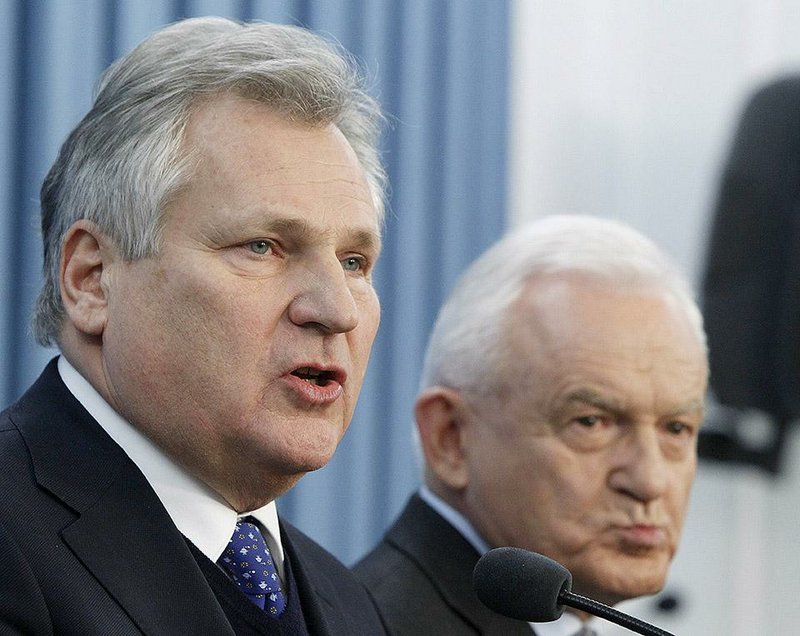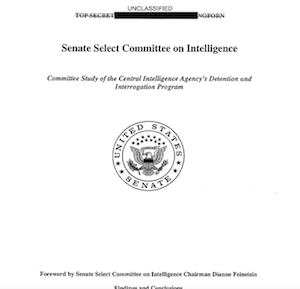GENEVA -- All senior U.S. officials and CIA agents who authorized or carried out torture like waterboarding as part of former President George W. Bush's national security policy must be prosecuted, top United Nations officials said Wednesday.
RELATED ARTICLE
http://www.arkansas…">2 psychologists helped run CIA grillings
Meanwhile, President Barack Obama's spokesman refused to say whether the president agreed with CIA Director John Brennan's contention that the agency's brutal interrogation methods had saved lives.
Zeid Raad al-Hussein, the U.N. high commissioner for human rights, said it's "crystal clear" under international law that the United States, which ratified the U.N. Convention Against Torture in 1994, has an obligation to ensure accountability in the wake of a Senate Intelligence Committee report on the CIA's harsh interrogation techniques at secret overseas facilities.
The report released Tuesday said that in addition to waterboarding -- a form of simulated drowning -- the CIA tactics included slamming detainees against walls, confining them to small boxes, keeping them isolated for prolonged periods and threatening them or their family members with death.
"In all countries, if someone commits murder, they are prosecuted and jailed. If they commit rape or armed robbery, they are prosecuted and jailed. If they order, enable or commit torture -- recognized as a serious international crime -- they cannot simply be granted impunity because of political expediency," he said.
U.N. Secretary-General Ban Ki-moon hopes the report is the "start of a process" toward prosecutions, because the "prohibition against torture is absolute," Ban's spokesman said.
Ben Emmerson, the U.N.'s special rapporteur on counterterrorism and human rights, said the report released Tuesday shows "there was a clear policy orchestrated at a high level within the Bush administration, which allowed [the CIA] to commit systematic crimes and gross violations of international human-rights law."
He said international law prohibits granting immunity to public officials who allow the use of torture, and this applies not just to the perpetrators but also to those who plan and authorize torture.
"The fact that the policies revealed in this report were authorized at a high level within the U.S. government provides no excuse whatsoever. Indeed, it reinforces the need for criminal accountability," Emmerson said.
Human Rights Watch Executive Director Kenneth Roth echoed those comments, saying "unless this important truth-telling process leads to the prosecution of officials, torture will remain a 'policy option' for future presidents."
The U.S. Justice Department has declined to prosecute over the interrogation methods, and the U.S. is not a member of the International Criminal Court, which began operating in 2002 to ensure that those responsible for the most heinous crimes could be brought to justice.
That court steps in only when countries are unwilling or unable to dispense justice themselves for genocide, crimes against humanity or war crimes. The case could be referred to the court by the U.N. Security Council, but the United States holds veto power there.
However, U.S. officials previously have been tried in absentia overseas over the CIA's treatment of suspects.
Earlier this year, Italy's highest court upheld guilty verdicts against the CIA's former Rome station chief Jeff Castelli and two others identified as CIA agents in the 2003 extraordinary rendition kidnapping of an Egyptian terror suspect.
The decision was the only prosecution to date against the Bush administration's practice of abducting terror suspects abroad and moving them to countries that permitted torture. All three had been acquitted in the original trial because of diplomatic immunity.
Ex-CIA chiefs react
Current and former CIA officials campaigned Wednesday to discredit the Senate's investigation, painting the report as a political stunt by Democrats tarnishing a program that saved American lives.
It is a "one-sided study marred by errors of fact and interpretation -- essentially a poorly done and partisan attack on the agency that has done the most to protect America," former CIA directors George Tenet, Porter Goss and Michael Hayden wrote in a Wall Street Journal opinion piece.
Hayden was singled out by Senate investigators for what they said was a string of misleading or false statements he gave in 2007 about the importance of the CIA's brutal treatment of detainees in thwarting terrorist attacks. He described the focus on him as "ironic on so many levels" as any wrongdoing predated his arrival at the CIA.
"I didn't lie and I didn't mislead Congress," he said Wednesday in a televised interview.
Regarding claims that the agency's interrogation techniques were harsher than previously disclosed, he said, "It may be more slightly layered in the details, but everyone knows what waterboarding does. It prompts the anti-drowning reflex in an individual."
"I'm sure it's horrible," he said on NBC's Today show. "But it's also horrible for tens of thousands of American airmen whom we used it against for training."
The intelligence committee's 500-page unclassified summary of the report -- which independent publisher Melville House plans to publish as a book this month -- concluded that the CIA inflicted suffering on al-Qaida prisoners beyond its legal authority, and that none of the agency's "enhanced interrogations" provided critical, lifesaving intelligence.
The report cited the CIA's own records, documenting in detail how waterboarding and lesser-known techniques such as "rectal feeding" were employed.
In one U.S. case mentioned in the Senate report, suspected extremist Gul Rahman was interrogated in late 2002 at a CIA detention facility in Afghanistan called Cobalt in the report. There, he was shackled to a wall in his cell and forced to rest on a bare concrete floor in only a sweatshirt. He died the next day. A CIA review and autopsy found he died of hypothermia.
Justice Department investigations into his death and the death of another CIA detainee resulted in no charges.
Brennan said after the report's release that the agency made mistakes and had learned from them, but he insisted the coercive techniques produced intelligence "that helped thwart attack plans, capture terrorists and save lives."
White House press secretary Josh Earnest said Wednesday that Obama retains confidence in his CIA chief. He rejected the suggestion by Sen. Mark Udall, D-Colo., that Obama "purge" his administration of anyone connected to the torture of prisoners.
"The president continues to believe that the men and women of our intelligence community are dedicated patriots," Earnest said.
Obama said Tuesday that the interrogation techniques "did significant damage to America's standing in the world and made it harder to pursue our interests with allies."
But Obama has repeatedly said since taking office that, while interrogation techniques were wrong and he wanted them ended, he had no interest in prosecuting those involved or revisiting how and why the decisions were made.
A Justice Department official said Wednesday that the department does not intend to revisit its decision not to prosecute anyone over the interrogation methods. The official said the department had reviewed the committee's report and did not find any new information that would cause the investigation to be reopened.
"Our inquiry was limited to a determination of whether prosecutable offenses were committed," the official said on condition of anonymity because the official was not authorized to discuss an investigation. "Importantly, our investigation was not intended to answer the broader questions regarding the propriety of the examined conduct."
Poland hosted prison
Meanwhile, after years of denials, two former Polish leaders acknowledged Wednesday they had allowed a secret CIA prison to operate on their territory but insisted they never authorized the harsh treatment or torture of its inmates.
Former Polish President Aleksander Kwasniewski and former Prime Minister Leszek Miller spoke after the release of the Senate report, which did not identify the host countries.
"The U.S. side asked the Polish side to find a quiet site where it could conduct activity that would allow to effectively obtain information from persons who had declared a readiness to cooperate with the U.S. side," Kwasniewski said. "We gave our consent to that."
He said Poland demanded that people who would be held in the country should be treated humanely as prisoners of war, according to their rights.
Kwasniewski and Miller both criticized the publication of the U.S. report, saying it hurt the interests of the United States and of its allies at a dangerous time for international security. They said it also could undermine confidence in America.
"If a key U.S. agency was deceiving its own president ... the allies will be asking: How can we trust our U.S. partners?" Kwasniewski said. "With this publication the Americans lose their potential as an ally."
Meanwhile, other European governments gave a muted response to the report.
European Union spokesman Catherine Ray emphasized Wednesday that the Obama administration has worked since 2009 to see that torture is not used anymore but said it is "a commitment that should be enshrined in law."
British Prime Minister David Cameron said that after the Sept. 11, 2001, terrorist attacks "there were things that happened that were wrong," when he was asked about the report.
"Those of us who want to see a safer, more secure world, who want to see this extremism defeated, we won't succeed if we lose our moral authority, if we lose the things that make our systems work and our countries successful," Cameron said.
German Foreign Minister Frank-Walter Steinmeier was quoted as telling the Bild newspaper that Obama had clearly broken with Bush policies.
Bush approved the program through a covert finding in 2002 but wasn't briefed by the CIA on the details until 2006. Obama banned waterboarding, weeks of sleep deprivation and other tactics, yet other aspects of Bush's national security policies remain, most notably the U.S. detention center at Guantanamo Bay, Cuba, and sweeping government surveillance programs.
Washington's "new openness to admitting mistakes and promising publicly that something like this will never happen again is an important step, which we welcome," Steinmeier said.
Meanwhile, China and Afghanistan joined human-rights advocates in criticizing the U.S.
"China has consistently opposed torture," Chinese Foreign Ministry spokesman Hong Lei said in response to the report. "We think the U.S. should reflect on that and correct related practices, to earnestly abide by and honor the regulations of international conventions."
Afghan President Mohammad Ashraf Ghani called the CIA practices "unjustifiable and evil" and said some Afghan citizens were among those tortured.
"No nation" will be able to have a prison on Afghan soil after the end of this year, when the combat role of U.S. and allied forces officially ends, Ghani said.
Information for this article was contributed by John Heilprin, Eric Tucker, Cara Anna, Bradley Klapper, Ken Dilanian and staff members of The Associated Press; by Angela Greiling Keane, Kathleen Hunter, Jonathan Allen, Jeremy Hodges, Chris Strohm and staff members of Bloomberg News; and by Alexandra Alter of The New York Times.
A Section on 12/11/2014

